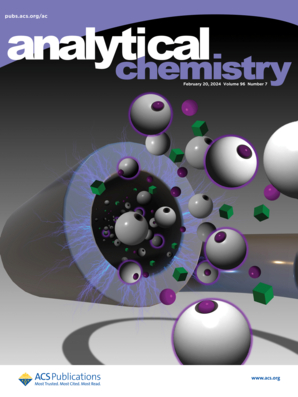利用DNA海草对miRNA生物标志物进行准确诊断的机器学习增强分析。
IF 6.7
1区 化学
Q1 CHEMISTRY, ANALYTICAL
引用次数: 0
摘要
作为潜在的乳腺癌生物标志物,microRNAs (miRNAs)在临床应用中具有重要的前景。然而,由于缺乏简单、超灵敏、高度特异性的检测方法和可靠的生物标志物,基于mirna的乳腺癌准确诊断受到阻碍。为了应对这些挑战,我们引入了一种创新策略,使用滚动圈扩增生成的DNA海藻(RCA-GDS)来检测多种miRNA生物标志物,并结合机器学习来实现精确的乳腺癌诊断。RCA- gds有效地将线性RCA扩增转化为指数扩增,有效地增强荧光信号,并在等温条件下在2小时内检测到低至原子摩尔浓度的mirna。利用TCGA数据库,我们筛选了一组mirna (miRNA21、miRNA182和miRNA183)用于乳腺癌的精确诊断,并在细胞内和血清样本中验证了它们的可靠性。最后,我们将机器学习算法与miRNA检测系统相结合,建立了一个鉴别诊断模型,该模型在独立队列中得到了进一步验证,并证明了出色的诊断准确性。这项工作不仅实现了超灵敏和高特异性的miRNA检测,而且推进了基于miRNA小组的乳腺癌诊断的临床应用。本文章由计算机程序翻译,如有差异,请以英文原文为准。
Machine Learning-Enhanced Analysis of miRNA Biomarkers for Accurate Breast Cancer Diagnosis Using DNA Seagrass.
As potential biomarkers for breast cancer, microRNAs (miRNAs) have demonstrated significant promise in clinical applications. However, accurate miRNA-based breast cancer diagnosis is hindered by the lack of simple, ultrasensitive, and highly specific detection methods and reliable biomarkers. To tackle these challenges, we introduced an innovative strategy using rolling circle amplification-generated DNA seaweed (RCA-GDS) to detect the multiple miRNA biomarkers combined with machine learning to enable precise breast cancer diagnosis. RCA-GDS effectively converts linear RCA amplification into exponential amplification, efficiently enhancing fluorescence signals and enabling the detection of miRNAs at concentrations as low as attomolar levels within 2 h under isothermal conditions. Using the TCGA database, we screened a panel of miRNAs (miRNA21, miRNA182, and miRNA183) for the precise diagnosis of breast cancer and validated their reliability in both intracellular and serum samples. Finally, we integrated machine learning algorithms with the miRNA detection system to develop a differential diagnosis model, which was further validated in an independent cohort and demonstrated excellent diagnostic accuracy. This work not only enables ultrasensitive and highly specific miRNA detection but also advances miRNA panel-based clinical applications in breast cancer diagnosis.
求助全文
通过发布文献求助,成功后即可免费获取论文全文。
去求助
来源期刊

Analytical Chemistry
化学-分析化学
CiteScore
12.10
自引率
12.20%
发文量
1949
审稿时长
1.4 months
期刊介绍:
Analytical Chemistry, a peer-reviewed research journal, focuses on disseminating new and original knowledge across all branches of analytical chemistry. Fundamental articles may explore general principles of chemical measurement science and need not directly address existing or potential analytical methodology. They can be entirely theoretical or report experimental results. Contributions may cover various phases of analytical operations, including sampling, bioanalysis, electrochemistry, mass spectrometry, microscale and nanoscale systems, environmental analysis, separations, spectroscopy, chemical reactions and selectivity, instrumentation, imaging, surface analysis, and data processing. Papers discussing known analytical methods should present a significant, original application of the method, a notable improvement, or results on an important analyte.
 求助内容:
求助内容: 应助结果提醒方式:
应助结果提醒方式:


